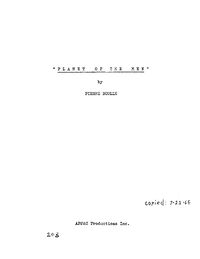
Title Page
When the 1968 movie Planet of the Apes proved to be an enormous hit, both critically and financially, it became clear that a sequel could further the success of the franchise. Producer Arthur P. Jacobs approached Pierre Boulle, author of La Planète des singes, which had inspired the movie, and asked him to submit a treatment for a sequel. Titled Planet of the Men (or La Planète des hommes, since Boulle did not speak English), it featured a messianic Taylor, 14 years after the events of Planet of the Apes, leading an uprising against the apes, following which they reverted back to their primal states.
Jacobs: "We didn't plan any sequel in the first one, but it became so successful that Fox said you must do a sequel, if you can come up with one. First I went to Pierre Boulle to write the screenplay. He said he didn't know how one makes one, then when I showed him a print of the first one, he was just absolutely ecstatic. He did write a treatment for a sequel, titled "Planet of Men," but it wasn't cinematic." [1]
Boulle: "After the success of the original film, Arthur Jacobs requested that I do a sequel for him. They accepted the treatment that I worked on, but they made so many changes that very few of my ideas were left. I don't recall it very well. It was completely different from what they finally used on the screen. I used the end of the first film as my starting point. Taylor realized that man still existed but had regressed to a primitive and savage existence. He decides to attempt to retrain and educate them to bring them back to a normal life. He teaches them the use of language. The apes consider this a great danger and a terrible war begins. Many of the subhumans contest Taylor's leadership because he wants to make peace, and in the end they win out and destroy all of the apes whom they greatly outnumber. I relate this very badly because I have forgotten it." [2]
Synopsis[]
PLANET OF THE MEN (A sequel to "Planet of The Apes") - 22 July 1968
The story begins with the final scene from the first film - Taylor is in front of the Statue of Liberty, in despair, Nova watching him: "And I believed that I had discovered a new world! This is Earth, nothing more than Earth!" There is a cracking of twigs in the nearby forest, and some humans emerge, approaching Taylor and Nova threateningly. Taylor raises his gun in readiness, but just then a buffalo comes charging through the undergrowth towards the group. Taylor calmly shoots the animal dead. In wonderment, the humans prostrate themselves before Taylor, much to his amusement. Nova, however, is ill, she points to a human baby to indicate she is pregnant. Taylor, suddenly aware of the possibilities presented to him, turns in the direction of the City of Apes and swears an oath to Zaius that one day, he 'will know real men'.
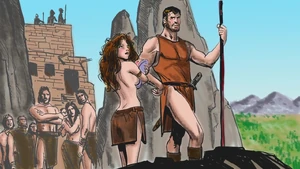
New Human Tribe
Four years pass. In the City of Apes, young chimps demonstrate, carrying placards reading "Release Zira and Cornelius" "Down with Tyranny", "For a Free Science". Lucius is the leader of the demonstrators. In Zaius' office, he and Maximus discuss the 'rebellion', while mounted gorillas break up the demonstration. Zira and Cornelius are brought from their cell to Zaius' office. He offers them freedom, with one condition. Zaius hands them a written report from a gorilla hunter: in the Forbidden Zone, a hunting party were confronted by an armed Taylor and his organised human followers. The hunt returned empty-handed, but the real cause of Zaius' concern was that the mate of Taylor was seen carrying a young child - his child. A second written report is from a chimpanzee who penetrated the Forbidden Zone: he saw a clearing where Taylor, with Nova and their son Sirius, was introducing the other humans to fire; the humans had begun to imitate Taylor's speech. After reading the reports, Zira and Cornelius are uneasy. They are given their freedom.
Ten years pass. In the City of Apes, a public election is taking place - Cornelius has challenged Zaius for the post of 'Minister of Science'. He is opposed to the anti-human war which is being promoted by Zaius. Lucius tells Zira that his rebellious chimp friends of ten years earlier have become older and been appeased by Zaius' political maneuvering; Zaius has allowed Cornelius to challenge him only because he knows he will lose, clearing the way for Zaius' war. In the city amphitheatre, Zaius makes his election speech - an appeal for war. Lucius heckles him, but is bundled out of the arena by an angry mob. Meanwhile in the human settlement, Taylor teaches a group of men to plow a field. They have built rudimentary huts in a village. He finds one of the younger humans, John, making an elaborate cave-painting.

Mr & Mrs Taylor
A few months later. Zaius, Maximus & two other orangutan leaders in his office listen to a radio broadcast of the election results (the ape population is 73,192) - Zaius wins overwhelmingly. He summons the head of the ape army, Field Marshall Urus, to discuss beginning the military campaign. Zira, Cornelius and Lucius decide they must go to Taylor to warn him of the impending danger. Travelling through the Forbidden Zone they reach the Statue of Liberty and are stunned, first by it's human visage, but then by the horde of men, directed by Taylor, who are working to haul the statue to an upright state. Taylor welcomes the ape visitors and shows them around his 'kingdom': the village; the cleared forest used for cultivating food; a vast building site being laid out in a grid style, similar to New York. Two clay-brick buildings have been completed: inside one is their 'university', where 13-year-old Sirius teaches reading and writing to a class of mostly young humans; the second building is the home of Taylor, Nova ("Mrs Taylor") and Sirius.
In the City of Apes amphitheatre ape politicians and military leaders are recruiting volunteers for the "Valient Simian Army", while in the Temple, the Minister proclaims a sacred crusade against the human menace. In Zaius' office, Maximus and the other two orangutans discuss the upcoming war, and Zira and Cornelius' treasonous desertion. They are visited by Urus, who recounts another human raid on one of his military camps - Taylor and Sirius led a group of men, disguised as apes, and captured rifles and ammunition.
In the 'Kingdom of Men', Zira and Cornelius prepare to return to their home, but Lucius decides to stay to fight alongside the humans. Sirius has overseen the digging of a huge defensive trench, which he then 'plants' with sharpened stakes. John, the artist, has 'invented' a grenade, using the captured ammunition. Taylor knows he will need this technology but is clearly uneasy at just how quickly mankind has reverted to it's worst traits. Their strategy is well-planned - some young humans will run around and lure the ape cavalry to the trench. Then Taylor's men will attack with guns, as Sirius' men attack the infantry at the rear. Lucius joins Sirius' group. Urus' ape army reach the Statue of Liberty, which Urus dismisses as "some prehistoric monument of no interest".
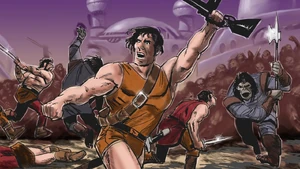
War!
The war goes entirely as the humans planned - the cavalry are utterly defeated, behind them the infantry disintegrates. Taylor captures Urus trying to escape and forces him to order a surrender. Elsewhere, Sirius' group mercilessly slaughter all apes, despite their surrender. Lucius tries to intervene, but the young men of the group tell him that Sirius, not Taylor, is their leader, and that Sirius has proclaimed that "the only good ape is a dead ape!" Lucius is struck by a spear and mortally wounded. The panicked apes begin to show animalistic behaviour - climbing trees and running on all-fours to escape. After the entire infantry has been massacred, Sirius is persuaded to lead an immediate attack on the City of Apes. Taylor, suspecting what has happened, goes to find Sirius. He is shocked at the carnage he finds, and a dying Lucius tells him to stop Sirius.
In the city, Zaius and his councillors eagerly await news of victory. A bloodied gorilla bursts in to the office to warn of a human invasion. In the amphitheatre, a politician's speech is drowned out by wild rumours about the humans, likewise with the Minister in the Temple. The panic has reduced many of the apes in the city to the same animal behaviour. Zaius, Maximus and the two increasingly-senseless orangutans try to formulate a solution - Zira and Cornelius, in prison and due to be executed the following day, must be asked to negotiate with the humans. The humans arrive and begin to slaughter every ape they find. They destroy the Temple and smash the statue of the Lawgiver.
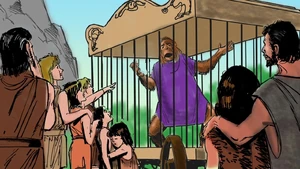
Caged
Taylor and Nova arrive that night, by which time the humans are in complete control, and just as Zira and Cornelius appear before Sirius, asking for peace. Taylor is disarmed by the young humans when he tries to intervene, and Sirius only grudgingly agrees to end the ape slaughter. He orders all surviving apes to instead be confined to cages, for the entertainment of humans. Zaius is captured, trying to escape. Sirius leads him past a cage holding Zira and Cornelius. Zaius and Taylor exchange a long, knowing glance. Zira talks to Taylor, and a young man attacks her. Taylor tries to defend her and is shot dead. As Nova grieves, Cornelius and Zira see the other apes reverting to primitive behaviour, and having brought two ampules of poison with them, they die rather than becoming like animals.
Some time later, an audience of children watch a circus performance. Three orangutans - Maximus and his colleagues - are holding a tea-party and dressed in ridiculous clothes. Then the main attraction is presented - Zaius, who is prompted, with some difficulty, to speak his own name, and rewarded with a sugar-cube.
THE END.
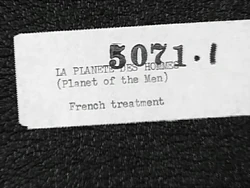
While the outline is intended as a sequel to the movie, and indeed bears little relation to Boulle's source novel, many themes from that novel are inevitably reintroduced by it's author. The character of Taylor changes in the very first scene, from the self-serving misanthrope of the movie to a benevolent leader of the primitive men, more in line with Ulysse Mérou's concern for the fate of the savages he encountered. The pessimistic ending, highlighting the failures of humanity, is common to both the film and the book. The character of Sirius is revived from the book, though explored much further and in an unexpected way. One, perhaps less-plausible, aspect of the novel was the permanent reversion of the learned Professor Antelle to a state of primitive savagery within a fairly short space of time. This is repeated in the very, very sudden regression of the defeated apes to mute unintelligence.
Boulle found the experience much less enjoyable than writing a novel, and attempted to write from the cinematic perspective necessary for screenwriting: "It was an interesting and amusing experience for me, nothing more. It's not the same. When I was writing I was thinking in visual terms, picturing the actors, Charlton Heston, and the others. I played the game, but my film was never made, and I don't even want to publish it, and it never will be. I haven't seen the second or the third film. I did read the script for 'Beneath the Planet of the Apes', but it doesn't interest me because it's no longer my work. It's something totally different." [3]
Arthur P. Jacobs declined to use the treatment, preferring to employ Paul Dehn to script Beneath the Planet of the Apes: "Then, I went to Paul Dehn and Mort Abrahams in London, and spent about two weeks, walking and walking, trying to figure out where to go from the Statue of Liberty." [4] In spite of Boulle's treatment being abandoned, it seems clear that it influenced the script of Beneath in a number of ways: firstly, in the chimp demonstrations against the ape authorities; secondly, in the concept of a war between the apes and the increasingly-advanced humans; thirdly, in the destructive and pessimistic climax; and most tellingly, in the character of gorilla warlord 'Field Marshall Urus', who bears striking similarities to the like-named General Ursus. Furthermore, Ursus' declaration that "the only good human is a dead human" is a direct inversion of Sirius' announcement in Men (though in fact the same statement was uttered by the Hunt Leader in a deleted scene scripted by Michael Wilson for Planet of the Apes[5]). Sirius' birth was also in Dehn's earliest story treatment, though he disappeared from subsequent screenplays. It's possible that assistant producer Mort Abrahams, who was credited with the story for Beneath (along with scripting by Paul Dehn) carried over some of Boulle's ideas and developed them into a new concept.
References[]
- ↑ 'Cinefantastique Planet of the Apes Issue' (1972) at Hunter's Planet of the Apes Archive
- ↑ 'Cinefantastique Planet of the Apes Issue' (1972) at Hunter's Planet of the Apes Archive
- ↑ 'Cinefantastique Planet of the Apes Issue' (1972) at Hunter's Planet of the Apes Archive
- ↑ 'Cinefantastique Planet of the Apes Issue' (1972) at Hunter's Planet of the Apes Archive
- ↑ Final Shooting Script at Hunter's Planet of the Apes Archive
